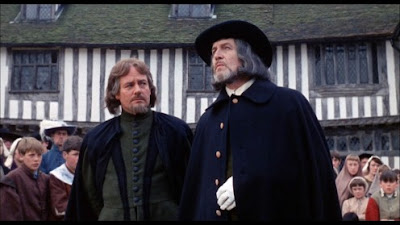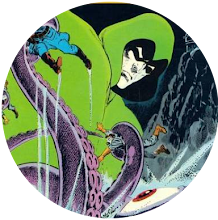Films like The Creeping Flesh and Horror Express manage to dutifully capture the Hammer lightning in their bottles while adding a whole new twist to them, despite being the product of totally unrelated companies.
Likewise, Tigon's Witchfinder General takes the Hammer feel and deftly fashions something memorable from it.
In it, Vincent Price's Matthew Hopkins stalks the villages of Civil War England, torturing and executing so-called witches in exchange for ample helpings of cash and nookie.
Unfortunately for him, when he decides to kill an innocent priest (Rupert Davies) and make use of his kind-hearted niece (Hilary Dwyer), he arouses the vengeful wrath of her fiancé Richard Marshall (Ian Ogilvy) who vows to God that he'll hunt Hopkins down and send him to his maker.
The even worse news for Hopkins is that Marshall is a newly promoted officer in the Roundhead army and brings several of his friends with him.
When the film came out in 1968, it was either berated by critics for its brutality and general all-round nihilism or simply ignored by them but, just as Hopkins was to face justice, so it wasn't long after its release before justice started to arrive for the movie and people realised they had a classic on their hands.
 The film's remorselessly bleak, with its characters inhabiting a land torn apart by war, prejudice and stupidity. It's a land in which few seem to feel any concern at all for their fellow man and will eagerly betray and kill each other at the drop of a hat.
The film's remorselessly bleak, with its characters inhabiting a land torn apart by war, prejudice and stupidity. It's a land in which few seem to feel any concern at all for their fellow man and will eagerly betray and kill each other at the drop of a hat.Likewise, the East Anglian countryside in which it's set is seen as both idyllic and sinister while clearly indifferent to the lives of the irrelevant and temporary beings who occupy it.
The film's completely dominated by the endlessly menacing presence of Price and it says everything about the power of his performance that he manages to stride around 17th Century England with an American accent and yet never feels in the slightest bit like he doesn't belong there. Likewise, Robert Russell as his assistant deserves praise for managing to make his own character a man you can't wait to see get a sword in the ribs.
Bizarrely, in America, the film was released as The Conqueror Worm, surely one of the worst titles for a horror film ever. Apparently, this was done in order to make it sound like it was an Edgar Allan Poe adaptation (Price being inextricably linked in the public mind, at the time, with Poe adaptations). Despite this madness, it did well at the US box office, even if the critics were as sniffy about it as British ones had originally been.
I've seen it described as England's only ever Western which is, to my mind, a stretch. While its theme of a man on horseback seeking to avenge crimes against his loved ones in a lawless time has much in common with Westerns, its setting and mood are too different from that genre for it to be a comfortable fit.
Praise also has to go to its soundtrack, which sounds like something from those public information films we had to endure in my childhood. The ones that always boasted about the work of the National Trust and informed us of ancient battles involving swords, flintlocks and cannons.
Witchfinder General isn't a period horror film in the sense that people like me tend to think of period horror films, thanks to it possessing no supernatural menace. In a sense, it's the antithesis of such movies, establishing that there's no such threat as the supernatural and promoting a rationalist stance in the face of superstition. But it's still a horror film, just one that reminds us that the worst monsters are made of human flesh and don't need magical powers in order to spread their evil. Needless to say, the Steve Does Comics' Thumb-o-meter give it a thumbs up.










































































7 comments:
WG is a good film. But someone really needs to make a film about making the film.
I'm sure that Mark Kermode's working on it even as we speak.
Radio 4 did a documentary about it a year or two ago; a pity it doesn't seem to be on the website or youtube as its well worth a listen.
As I recall, Price came into things relatively late in the day and originally WG was written with Donald Pleasance in mind for the title role.
Enjoyed the post, Steve - I like the theory that WG is basically a western.
-sean
Still shocking after all these years. I remember one scene where one of Ogilvy's soldier mates is stabbed and you think he'll just scream, fall over and then we'll be on to the next bit.
Except the camera stays there forever watching this guy dying and screaming. The whole film's like that.
Witchfinder General was directed by Michael Reeves who died in 1969 aged just 25. As well as the documentary mentioned by Sean, Radio 4 also produced a play about the making of Witchfinder General. In the play the director Michael Reeves accuses Vincent Price of being a ham actor and Price threatens to quit and has to be persuaded to stay - I don't know if that really happened but I enjoyed the play when it was broadcast about five years ago.
From all reports I've read, it does appear to be the case that Price and Reeves spent great chunks of the filming at loggerheads with each other, with Reeves constantly telling Price to rein in his acting and Price getting increasingly fed up of it.
Actually Colin, a more recent repeat of that play is what I was thinking of.
I was probably getting it mixed up with that Black Aquarius documentary they did about witches and occultism in British popular culture of the 60s and 70s.
(That is still on their website, and worth a listen if you're interested -
www.bbc.co.uk/programmes/b05qvr63
Erm.. not that it actually covers Witchfinder General at all)
-sean
Post a Comment